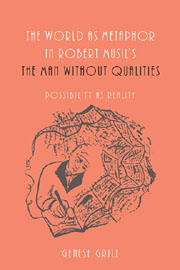2 - Repeatability and Crime
Published online by Cambridge University Press: 05 February 2013
Summary
Humans both desire and tire of the security and inevitability of senies-gleichen geschieht (the selfsame happens) and long for and fear its equally inevitable interruption. This tension is palpable, again and again in seemingly infinite variation, in both the themes and the experimental techniques of Musil's novel. Its complications are expressed only in part by Ulrich's confession to his sister Agathe, “Ich habe auch das unstillbare Streben in mir, die Erlebnisse wiederholbar zu machen. Aber in dem Augenblick, wo sie es sind, ist die Welt materiell und langweilig. Du hast gestern ein Wort gesagt, das mich ergriffen hat: Alles, was wir tun, ist unwiederholbar …” (MoE, 1645; I also have this irrepressible striving in me to make experiences repeatable. But in the moment when they become repeatable, the world is material and boring. Yesterday you said something that moved me: everything that we do is unrepeatable …).
One may agree with Agathe that nothing we do is repeatable. Or one may believe that there is nothing new under the sun, while still believing that human innovation or choice and will can contribute something to the status of reality; or believe that at bottom “das Ding an sich” is a priori constant but also acknowledge that human subjectivity inhibits a communal agreement on what any given thing is. As is philosophically current, one may argue instead that any seemingly common or shared truth, essence, or experience is nothing but a social construct, invented by the “power elite” to enforce conformity to a value system “privileging” its own interests.
- Type
- Chapter
- Information
- The World as Metaphor in Robert Musil's 'The Man without Qualities'Possibility as Reality, pp. 49 - 92Publisher: Boydell & BrewerPrint publication year: 2012



